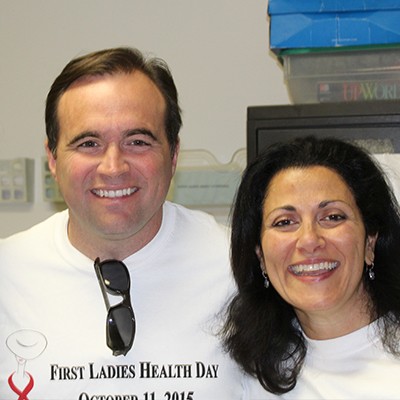Closing the Gap in Screening and Treatment
for Gastrointestinal, Pulmonary Conditions
In Cincinnati, Making a Difference Screening for Asthma
Churches, local government and businesses team up to screen underserved urban populations for many chronic conditions through the First Ladies Health Initiative of Cincinnati. Boston Scientific joined with the local chapter of the organization to help screen for asthma and lung cancer.
Dena Cranley, Cincinnati’s “First Lady” by virtue of being married to Mayor John Cranley, found out fairly quickly that she wasn’t the only first lady in town. After calling New Prospect Baptist Church Pastor Damon Lynch III and inviting him to her husband’s mayoral swearing-in, she learned that every African-American church had its own First Lady, too.
“When I hung up the phone, I thought, wow, wouldn’t it be great to get these ladies to come together and make a difference in the community?” Cranley said.
That first conversation led to a friendship between the pastor’s wife Barbara Lynch and Dena Cranley. Lynch became co-chair of the First Ladies Health Initiative of Cincinnati, which met regularly at Cranley’s home, and eventually swelled to about 30 first ladies and Ambassadors. They discussed how they could improve health disparities in neighborhoods underserved by the healthcare system, which led to an idea both ambitious and complex, in terms of planning — hosting a family health day across the churches on the same day, inviting members of 28 local churches to health fairs at 18 locations, on the same day, and providing health screenings for such things as vision as well as tests for hypertension, HIV, hepatitis C, diabetes, asthma, lung cancer, prostate cancer, behavioral health and preventive measures by offering flu shots.
Last October 11, Cranley, Co-chair Lynch and 27 other first ladies, along with a cast of more than 800 volunteers pulled off the event, christened “First Ladies Health Day.”
Not Just Screening, but Treatment, Too
A physician and nurse staffed each location, in addition to each first lady (some locations hosted by two) and volunteers, from local health systems, churches and 40 healthcare companies, such as Boston Scientific. Screening wasn’t the end goal of First Ladies Health Day; patients whose screenings led to recommendations for follow-up care were contacted after the health day to make sure they followed through with appointments and treatment.
In total, more than 3,000 people attended the First Ladies health fairs across Cincinnati. Some 2,000 attendees—adults and children—took part in the screenings offered.
Boston Scientific volunteers focused on asthma and lung cancer screening. Four hundred attendees received information about asthma; 167 took a survey and 38 were referred for follow-up care with the interventional pulmonary team at the University of Cincinnati. About 70 patients were referred to the University of Cincinnati Cancer Institute for follow-up care, either CT scans or smoking cessation programs, based on their lung cancer screening at the health fair. As with other Close the Gap programs and events, Boston Scientific took a hands-on approach, tailoring its involvement to add the greatest value possible.
“Boston Scientific was very supportive,” Cranley said. “It was a great day for our city, and it was partners like Boston Scientific that made it happen.” She added that the partnership will likely grow. At the next fair they’re planning, the First Ladies will add a colon cancer screening component to the health fairs – and Boston Scientific offered to support that pursuit, too.
Thinking of taking on a project like this in your community?
The complex rollout of health screening for 2,000 people requires not only getting the word out to potential patient attendees, but a volunteer network to serve them. Cranley and local Boston Scientific sales representatives Lenny Saia and Amy Reed, who took part in the screening day, offer some advice for organizations hoping to duplicate the success of the Cincinnati First Ladies events.
• Unity breeds success. Despite many different sponsoring organizations, health systems and advocacy groups the look and feel of every piece of collateral was the same, down to everyone wearing the same t-shirts at all the locations. The sometimes competitive churches, health systems, non-profits, industry vendors all teamed to serve the community with a common goal: a powerful, united message and service for a common cause.
• Find a strong advocate within the local health system. For the First Ladies Health Day, a key moment was enlisting the help of Michelle Ottersbach, nurse clinician program director at UC Health, who was able to persuade some of the system’s top physicians to volunteer at the screening locations as well as respiratory therapists (RTs) and nurses. Cranley relayed feedback from many of the volunteer practitioners that, “This is why I went to medical school – to connect with people in my community,” or similar sentiments. She knew that once they took part in such an event, they will likely return to do it again, and within days, the UC Health team asked to participate again next year.
• Enlist a well-organized project manager. Engage and empower a passionate project manager who not only has strong skills, but who is willing to keep organizational leaders in the loop with frequent updates and progress reports. When everyone’s in the know, everything comes together as planned.
If you have an idea for addressing health disparities in your community, email Boston Scientific closethegap@bsci.com.
